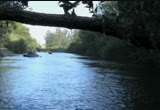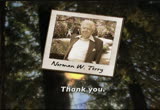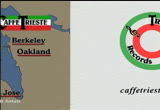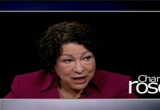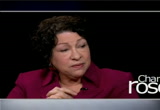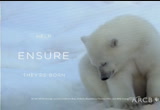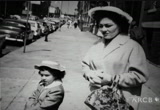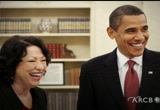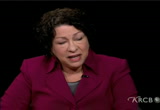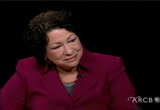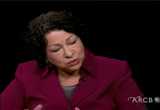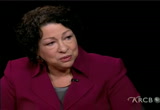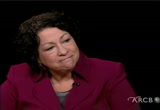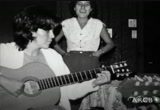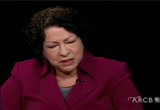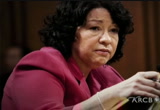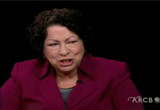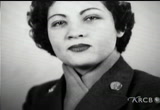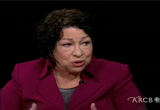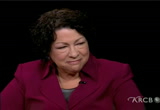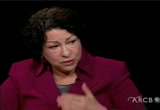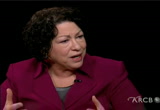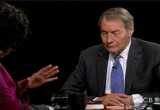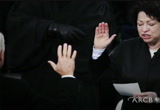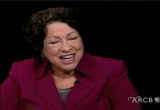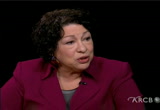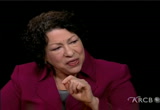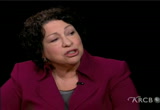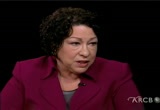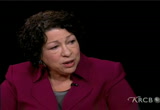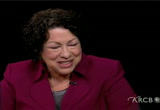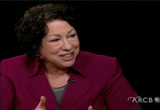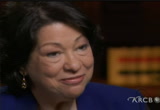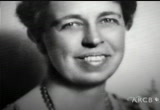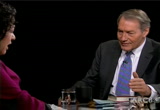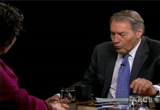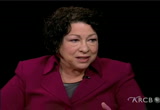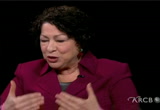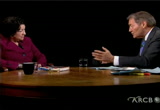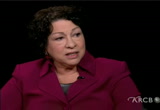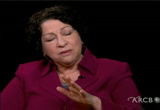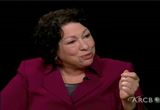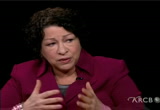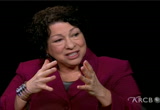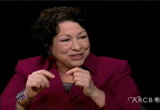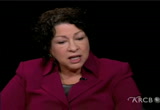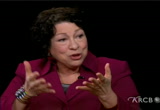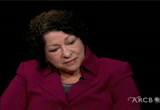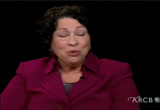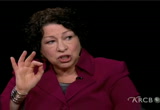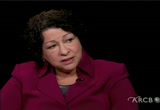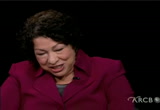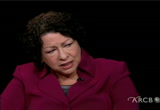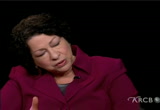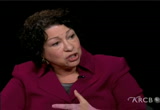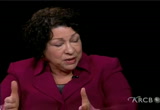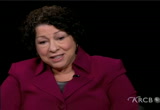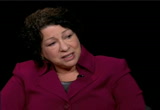tv Charlie Rose PBS February 6, 2013 11:00pm-12:00am PST
11:01 pm
11:02 pm
the supreme court and has written a new book called "my beloved world." >> it's what the whole book is about. it's how i stand on the shoulders of so many people who have helped push me up. who have supported me, oned doors for , helped meo learn. you know, i talk to people now sometimes on the book tour who say to me "i've done it alone." and i look at them and i say think about that statement. you may not have had parents who could have helped you, but i suspect you had someone in your life who's given you more meaning in an important way. whether it was a teacher, a grandmother, a relative, a friend whether it's a suse ere are always peopleho come to aid you in your life. recognizing it and being grateful is so important. you have to really understand
11:03 pm
when you're being motivated by your own feelings rather than by the law. i can't tell you how many times when i was a lawyer and sometimes even now you read a opinion below andou say "what's motiving this?" is it the law or a person feeling? >> rose: what's the danger here? >> the danger is that you think of judges as computers, which we are not. we are human beings with strengths and weaknesses with limit takes in our life experiences. you want us to be aware of both those things. the good and the bad, the biases and the prejudices so that we
11:04 pm
11:05 pm
captioning sponsored by rose communications from our studios in new york city, this is charlie rose. >> rose: associate justice sonia tomayor is here. she made history in 2009 when she became the first hispanic and the third woman to sit on the supreme court. her story embodies the american dream. she grew up in a public housing project in the south bronx. at age seven she was diagnosed with type one diabetes. her father a factory worker died the following year. she and her younger brother were raised by a single mom who worked long hours just to make
11:06 pm
ends meet. but adversity did not stop her from ascending to the top of her profession. she went from high school valedictorian to princeton graduate to law review editor at yale. she served as a prosecutor and a corpate late gator before she was appointed as a district court judge. while still in her 30s. and then was appointed to the court of appeals. 11 years later she was sworn in as the nation's 111th justice. she tells her personal story in a new memoir. is it called "my beloved world." i am very pleased to have justice sonia sotomayor at this table for the first time. welcome. great to see you. >> thank you, charlie. i'm delighted to be here. >> rose: welcome back to new york. (laughs) >> you know, it will wa be e home o my heart. as you may know, i've bought an apartment in washington and it's my new residence. >> rose: i've been reading ant how you're getting to know the neighborhood and all that. >> oh, yes! (laughs) but there's always a part of new york that kind of lights up my
11:07 pm
insides and my smile. >> rose: so you've written this book. here is what the "new york times" said today in a big story about you. right here on the front page of the "new york times" they said you have become the queen of the book tour according to the "new york times." "welcome to another night in the life of sonia sotomar. sueme court justice current queenf best-seller list and suddenly the nation's most high profile hispanic figure. the release of her new memoir my beloved world suggests she has broader ambitions than her colleagues to play a larger more personal role on the public stage." accurate? >> no. i think that reporter misunderstood the purpose of why i'm doing what i've done. the book explains itself. >> rose: right. >> it says i have that lived a life with a l of cllens, a life maybe not identical to everyone, but i think in reading this book everyone will find pa piece of my life that rings
11:08 pm
accord within them. and my hope was as people read it at the end they would come away saying "you know, she's just like me." and if she can do what she did so can i. maybe not be a supreme court justice, but chase that dream atever they have. and find a place along the journey that will enrich them more and will bring something special into their life. because that's what i think it's about, the journey. but what that misperceives a s that i don't have an ambition to be on a more public stage. i have no ambitions of that nature. what i wanted to do was touch people and touch their sense of hope. >> rose: let me try to defend her for a second. >> ah! okay. >> rose: she's a very good reporter. >> i'm sure of that. >> rose: not that you had something ambition to be something that you wen't but you oughyour sto was pa of the public conversations and
11:09 pm
that from your personal story might mean -- might give meanings to other people's lives and therefore you would talk about the life you have lived in the hopes-- where whether it's diabetes, whether it's hard work whether it's a mother that care deeply about you and your brother who became a doctor-- there would be in those stories something very human and meaningful. >> if that's what she meant i agree with her wholeheartedly. >> rose: how am i doing representinger? >> you're doing a wonderful job. sh should hiyou as hur lawyer. almost almost unavoidable for know realize that people were very interested in my personal story. almost every audience i spoke to during my first year on the supreme court, half the questions would be about the court and its processes, as to be expected. the other half, however, were about my personal circumstances. and it was very clear from the people asking that they were
11:10 pm
looking for somhing. that they intified in some way with my story and wanted to know more about the lessons i had learned in my life. a lot of the questions came from kids but a lot of questions came from adults still seeking. >> rose: and what are they asking as you go across this country meeting people on your book tour? what is it they ask of you? >> you know, almost the same questions even after reading the book. there's this sense that it's impossible to do what i've done. and yet the book tells them not onlys it psible but don't have answers that require special talent. is i talk to kids, they'll ask me what's the greatest obstacles you've met? and my answer to every one of them is -- two. one is fear because it can paralyze you and you need
11:11 pm
friends around you when you're that insecure to look at you and say, oh, stop being so ridiculous. push you fromehind to keep gog. and t second is people's arrogance in thinking they can't say i don't know. and those are two things that don't require talent, they don't require some magical quality in each individual, it requires just a recognition of what have can hold you back and the ability to say, yes, i'm afraid but i'm going to try anyway. and the ability to say i don't have all the answers and i can ask others for help. >> rose: did you always belve in yourself? >> hmm. i believed that if i worked hard enough at a task i might not be able to master it perfectly but
11:12 pm
i could become competent. and so i describe in the book not being a very good salsa dancer despite popular rumors. >> rose: (laughs) yes. >> but i figured out-- because i'm a little bit -- i am pitch deaf and i have no sense of innatehyth >> rose: now i've found something you and i share. >> oh, i can tell you, i'm sure we share more. but i found out how i could compensate and that was by watching my partner and taking his lead. and so i found a way around the problem and that's what i mean about i always had enough faith in myself to know that if i kept trying i'd figure a way either around the problem or master what it is i was trying to do. >> rose: when you had to take -- receive daily injections of
11:13 pm
insulin because you were type one diabetic, your father did it your mother did it and you weren't satisfied. you wanted to do it so you learned to do it yourself. >> well, all you have to do is receive a shot from two scared parents each of which hurts you, one was worse than the other. my trained nurse mother was so resolute in her intent to give me the shot and i think internally probably so upset that her jab was even harder than my father's. >> rose: so you said "i'll do this." >> i've got to do this. i can't be hurting like this forever. and the reality is that there were other reasons that i detail in the book but, yes, you're right there. 's a sense that i -- there was a part of me that has at times been wracked with insecurity but most of the time i've been willing to say "let me try." and i think that if i cansort
11:14 pm
of open that possibility up to people in my book than the book will have meaning to many. >> in your judgment, have you worked harder than most people you know? >> oh, what an interesting question. hmm. i don't think. so i know lots of people, especially you're a lawyer and a judge -- you know my colleagues. virtually every one of them works as hard as i do. that was true on every level of the judiciary i've been in. and regrettably one o the prices of being a lawyer is that you do per-hour work which means to make your living you've got to work long hours so, no, but are there people who have chosen to balance their life in other ways and work less hours than i do? yes, obviously. >> rose: let me go back to the south bronx. not only are you very successful your brother is a doctor. >> he is.
11:15 pm
>> rose: describe your mother for me. >> oh, the book doeshat. >> re: i know. >> my absolute favorite chapter in this book is the one -- chapter 7, the story of her life and of her romance with my father. it's a story that i found in writing this book. i tell every audience don't jump to that chapter first. read what precedes it because to appreciate chapter 7 you have to know what had happened to me and what i saw as a child to understand the beauty of what i learned in chapter 7. but my mom -- i'm my mom. >> rose: you are your mom? >> i am my mom. a woman with a lot of strengths, a bit more insecurities than i've had, but a lot of vision about what was important in life. education being the primary importance and if i heard once i
11:16 pm
must have heard everyday in my childhood education opens the door of opportunity for you. it took me a while to realize that that's not the only thing it does for you. it also enriches you as a person. but she also taught me what i think the most important thing and that's to be caring about people. now, my mom didn't understand public service in the way that i've participated in it. sort of didn't lead community boards or lead -- >> rose: she probably didn't have time! >> she didn't. she was raising two kids and working six days a week and trying to survive. but she showed me what it meant to care about people. i detail in the book how my mother was a local nurse to the projects in the co-op city where we lived, how giving she was to everyone she's met. and i learned from her example
11:17 pm
that that was an important value in life to give to others. >> rose: did you also learn in your experience that you cannot do it alone? >> oh, gosh, that's what the whole book is about. it's how i stand on the shoulders of so many people who have helped push me up, who ve supported me, opened doors for me, helped me to learn. you know, i talked to people now sometimes on the book tour who say to me i've done it alone. and i look at them and i say think about that statement. you may not have had parents who could have helped you but i suspect you had someone in your life who's given you more meaning in an important way. whether it was a teacher, a grandmher, a reliv, a frie, whher is a spouse. there are always people who come to aid you in your life
11:18 pm
recognizing it and being grateful is so important. >> rose: have you had great mentors? >> tremendous mentors and each one of them taught me something very important. >> rose: what do you mean? >> every one of them has hired people who they thought were smarter than they. >> rose: me. >> i understand you do the same thing. i've been told that. >> rose: i do. (laughs) >> i'mold byhe president that he does that. to have the confidence not to be challenged by people who are smarter in a negative way, to be afraid of them but to grow yourself from them is a wonderful, wonderful -- >> rose: also you have to be careful that you don't intimidate people. one who has power has to make sure that the power doesn't intimidate someone so they don't tell you what you need to know to do your job best. >> i actually have a beginning conversation with my law clerks ea year and i sit tem down and tell the "i don't hire
11:19 pm
yes people. you will have failed me if you think i'm wrong and don't challenge me to think differently." >> rose: so what are you looking for in the kind of person that you want there that you're going to give a leg up to by the association into the world of a legal life? >> you look at grades and you look at accomplishments but you also look at writing skill and so i read the writing samples given to me and you see the strength and the weaknesses of their capacitys in writing. some people just haven't quite gotten there yet in their writing experience and you can tell that from the writing samples you give me. but in the end for me i'm looking for good people. i see that reflected in whether they're team players.
11:20 pm
how much have they been able to lead people to do things that aren nmall accomplished? because that tells me that they're respected and i want to see passion. >> rose: (laughs) yes. >> and i don't care of passion it is. i hired someone who had been a passionate teacher. she changed into law for a variety of different reasons. but as a teacher you could see that her heart was really in it. i have hired peoplehose backounds are just totally different from mine and all they want to be-- not all, but they want to be successful lawyers in private practice. that's a passion. >> rose: yes. >> i describe some of my friends in here who have that passion in my book. i just want to see that they
11:21 pm
really have worked hard at accomplishing something important in the activities they undertake and that they can talk to me about something that really excites them. >> rose: there are people who write with more style and flourish on the court than you do. and you acknowledge that. >> uh-huh. >> rose: do you choose the way you do it out of what would be is your skills or out of what you think is the best way to get across the point. >> rose: best way to get across the point. i actually believe that you persuade by legal reason. you have to put emotion into your opinions and i certainly do. >> rose: and human example. >> and human example. i don't think that's missing from my opinion. if you read my opinion you'll see when i'm upset about something and think that something needs to be expressed about the human condition. but that's not going to convince anybody to say that this is the right answer merely because it's right, that isn't going to change anyone's mind to show it
11:22 pm
to them in the law, to make them understand why the law is structured in the way it is. you have to do it with pure legal reasoning. >> rose: but are those two things mutually exclusive? can't you have pure legal asong and also a brilliant wordsmanship? >> yes, you can and learn at hand and other great judges have. >> rose: oliver wendell holmes. >> i haven't quite found that yet. >> rose: in your own sill? >> >> in my own self, how to do that fine balance. but i think -- i've been a judge for 20 years. i think my work's craftsmanship is pretty darn good. and i think it's persuasive legal writing. so i haven't aspired to much more than that. i let my creativity come o in this book. >> rose: what did princeton give you? >> well, i learned how to write there. >> rose: yes.
11:23 pm
>> and that was because i had two history professors who took an interest enough in me to help me figure it out. ful i talk about what i did which was to reread grammar books from first grade through high school and vocabulary books i learned five new words a day. an examnal my brother took on when he got to college, he thought vocabulary books -- took some of the ones that i still had left over and memorized five new words a day. but they also taught me the beauty of learning. i went to princeton with no preset notion of what i would major in and i wanted a wide exposure. i wanted that liberal arts education. i took economics courses, sociology courses, psychology courses, lots of history and political science courses. but an art course just to learn
11:24 pm
about art. i took a philosophy course because i had loved the one philosophy course i had in high school to learn about the philosophy ideas of the rest of the world. and so for me princeton gave me the opportunity to be a real student in the sense of having my world expand in a way i had never anticipated before. >> rose: when did you decide the go to law school? >> that i decided when i was veryoung. >> re: serious? >> very, very serious. i have notes from grammar school friends who were with me through those years throughout the entire time and one of them said to me "you were talking about being a legal as early as fifth grade." and that's about right. >> rose: but was it because of television? >> oh, as you will learn from the book, it was a combination of two things. the unsophisticated reason for
11:25 pm
becoming a lawyer was from television. i was diagnosed with diabetes, i love nancy drew but after my diagnosis i learned i couldn't be like her because i couldn't be a detective. and by watching perry mason shortly after that information came to me i figured out that half a show involved investigation of the crime and the other half, his work in the courtroom, to prove the guilty party guilty. the guilty witness guilty. now that's never happened in real life toe and it's never happened in any transcript i've ever seen that a defense lawyer breaks down someone to confess. but it wasn't that that motivated my desire to be a lawyer. it was the investigative part of it. it gave me a way to accomplish
11:26 pm
the that childhood desire to be nancy drew. the idea, though, stuck and it stuck as i proceeded to sort of start thinking about educating myself in public speaking,n debate, in student government. all of those activities reinforced for me that i might make a good lawyer. but i think in the end what convinced me to be a lawyer the most was understanding that it was -- law was a way to help people structure their relationships. >> rose: which is why we need rules and regulations and law. >> i talk about the importance of "lord of the flies" in my life. >> rose: tell us, wh was the important "lo of the fls." >> showing me what society could break down into without the rules and regulations. >> rose: exactly. >> but something else. which is without an influence in this society that accepted the
11:27 pm
importance of those values, most of us get it through our families. they teach us how important order is to each us and decency is to us. that's partly for from morals, partly from religion, it's also from the law. and these young ones, these kids didn't have their that influence last long enough to draw them into an ordered society. >> rose: so what was the primary influence of the private catholic school you went to. >> to help me choose to be a good person. >> rose: your parents taught you that? >> they didn't tell you, they taught in the a lot by example. and discipline, obviously. i talk a lot about -- >> rose: i'm sure they disciplined you. >> oh, they did, in not always such nice ways. i describe that in the book.
11:28 pm
but they talk to you about the choice we had as people. to be good or bad people. and they taught about the consequences of that in the afterlife but it seeped into understanding that to choose to be a good person was, a, a oice and b, o with importance. and to me that's an eternal gift. as you may know, my grammar school is being closed by the archdiocese. >> rose: i do know that. and >> and i am so incredibly heartbroken because my grammar school and almost all on that list are all inner city schools where parents are sending their kids because it's the only choice they have for a slightly safer environment than the kids may face the plic schools
11:29 pm
that exist in their neighborhoods. but also catholic schools had been for decades the feeders of our communities to higher education. the statistics are unassailable. kids who go to catholic schools tend, a, to graduate from high school and many of our communities have disasters high school dropout rates. that's already an accomplishment. and second many of us feed into colleges thereafter. and the discipline lets us finish college as wel so i'm heartbroken by what's happening. and so sad. i have a personal reason for my sadness because i loved my grammar school and every time i've gone back in recent times to meet the kids they're all just like i was. >> rose: yes, exactly. you went from yale law school where you were an editor of the law review. you went down to new york and became a prosecutor with a legendary prosecutor here,
11:30 pm
morgenthau. do you think people are cut out to be prosecutors? >> oh, what an ieresting question! there are some people and i have some friends who didn't choose prosecutorial work who chose defense work because they didn't feel comfortable in that role. so there are some people who are more comfortable in a different role. but as i point out in my book, we're all doing the work of justice. whatever side you're on you are fulfilling an important need in our judicial system. there are prosecutors who represent the society and there are defense attorneys who represent the ideals of this society. which is putting prosecutors to the test. can you really prove your case? and you need both to make this system a fair one. >> rose: so then you went into private practice. >> yes. and loved that, too. >> rose: were you tough?
11:31 pm
my friend scott pelley reminded us of what one person said about you. let's run that. roll tape. here's scott pelley, my colleague at cbs with the associate justice. here it is. >> after four yars with the d.a. and the end of her marriage to her high school sweetheart sotomayor cleared her mind and the air. she quit smoking and joined a form practicing corporate law where some of the men didn't seem all that comfortable with her. you write in your book that one day one of the associates, one of your colleagues was on the telephone and he described you-- your words not mine-- as -- >> his words. >> as one tough bitch. >> ye. >> and when you heard that, you thought what? >> what in the sworld wrong with me? i was a pretty enough negotiator and hard to push around and i
11:32 pm
don't think they were used to my kind of toughness then. >> rose: is his description in any way unfair? >> probably not. (laughs) >> rose: so is there something that hangs a sign in your office that says what about women? well-behaved women don't make history. >> rose: do you believe that? >> yes. >> rose: what does "well-behaved" mean? >> if you're not willing to take a chance, to do the right thing even if others perceive it as a risk as not being within the norm of expectations you're not going to make history. you're not going to be an eleanor roosevelt unless a woman of her generation was willing to step out o the noalirst lady role take a more public position on issues that were important to her. whether i agreed with her issues
11:33 pm
or not, you won't succeed. >> rose: you've made history because of this appointment to the supreme court. do you want to make history in terms of what you do on the bench? >> well, if what you're talking about is that somehow you're going to write opinions that are going to create wle cloth a new direion r the courttor society -- >> rose: yes. >> you don't want to do that? >> no. >> rose: why not? >> because i'm a great respecter of the law. >> rose: can't you respect the law and believe the law is imperfect? >> absolutely. and that's why -- >> rose: believe that you may have the opportunity in the sense? think of brown. have board of education. >> absolutely. and there may be a case. >> rose: that's a historic decision! and there may be a case in which i look at what our precedents have been and enough time and evidence is demonstrated like in "brown" at we made a
11:34 pm
horrifically wrong decision and the courage of any justice, the ones -- the nine men who overturn "plessy v. ferguson," they understood the moment had come and i hope i have the strength to do that, too. but that doesn't mean that that's what you try to do in every case that comes before the court. >> rose: this reminds me of the great senator patrick moynihan where someone famously said had written more books than most senators hav read. >> (lahs) i have to s having spent a lot of time talking to him that was an apt saying. not to suggest that senators aren't educated. >> what has come up-- and this has to do with the life you have lived-- this great question of what shape shapes a judge's decision. clearly the law shapes a judge's decision. but there is other things.
11:35 pm
and your consideration the word "empathy" came up because the president said "i want somne with pathy. give me your take on all of that. because it became an issue in the confirmation. i can't speak for the president and that's what i said during my confirmation hearing. i don't understand why he used that word. i wouldn't have used that word to describe myself and still don't. but what i say is that you want judges with a varied life experience. so that when they're listening to people's arguments they don't miss whathosearguments mean tohose individuals. that doesn't mean that you're going to rule in favor of that party merely because you might be familiar with what they're experiencing. i talk about the fact that all judges have life experiences and if you were going to refuse
11:36 pm
every judge from a case merely because he or she has experienced something similar we wouldn't get any judges to rule on cases. i talk about a simple example. yoknowudge get sick. they don't all have chronic disease it is way i do, but we let judges with all kinds of backgrounds, whether they their own or that of a relative decide cases involving hong kong claims. why do we do that? because we have confidence in our system of government that what's important is not the judge's individual experience but the belief that a wide variety of experiences will let the conversation occur in conference for which all t be arguments on both sides of the case are discussed. >> rose: yes. >> the worst thing in the world is to have a vote where people haven't understood the argument. do you they the justices who
11:37 pm
wrote "plessy v. ferguson" and decided separate but equal really understood there could never be anything like separate but equal facilities? >> rose: i think in the words of the opinion, separate but equal is inherently unequal. >> exactly. and there was no one on the court except justice harlan, but even he didn't get the point. >> rose: okay, but then tell me what your experience as the woman who's lived the life you've had, coming from the south bronx, living with a disease that you live with, diabetes, having to maintain your health the way you do, not divorced, not married without children, a loving mother, all the things that have shaped you, success after success. when you make a decision how does that influence you? and most importantly, or equally important, the idea of being
11:38 pm
hispanic. because everybody wants -- everybody's talking about latinos today but everybody before that understood that that kind of experience was part of had become america. >> that is what america is. can i give you an example? i'll take it away from myself. that was case a number of years ago where a 13-year-old girl had been strip searched to look for an pirin in a no-drug school. and her parents sued -- it was a public school-- claiming this was an unreasonable search and seizure. that there wasn't adequate probable cause to search her in that way. during the argument, some of my now male colleagues-- i wasn't on the court then-- started asking questions suggesting that being strip searched was no different than being -- than unpressing in a gym.
11:39 pm
justice ginsburg was heard to say after that argument that she thought some of my colleagues didn't understand -- might not have understood how sensitive a 13-year-old girl might be about her body particularly at that age. now, did that affect the outcome of the case? i wasn't a justice, i doubt it very much. but i do know one thing: n one juice on the crt wro ou being searched at 13 as being comparable to undressing in a gym. if someone had written that it would have upset so many young women who would have been -- who would have rightly felt by that comparison. and i think that's what life experiences help with.
11:40 pm
it's legion among justices on appellate courts and other courts that having a colleague who has had eerience as a trial court will ensure that any inadvertent questioning of the capabilities of a district court judge don't seep into an opinion. because people who haven't been trial judges are not sensitive to how insulting certain references -- >> rose: but you were a trial judge at the district court level. >> and, you know, i can't say without disclosing confidence that there mig berefences in some opinions that would suggest something that's not intended. and that gets picked up. >> rose: what is it that you said in the san diego speech? >> it was berkeley not san diego. but that i would hope that a wise latina judge would make a better decision than a wise
11:41 pm
non-latino man. >> rose: do you believe that? >> no. >> rose: why did you say it? >> because in context anyone who read the speech will knowhat was what i was saying was a -- the rest of the article was talking about inspiring young people who didn't feel like they were a part of the greater american system to understand that they were equal to others and that their experiences were valuable. i talked very directly in that speech about the fact that it was nine white men who decided brown v. board of education. and i also talked about the fact that it's not race o jender that give you a certain view point. i said this directly in the article. "brown v. board of education." not every woman thinks alike. not every black or latino person thinks alike or will rule the same way on every issue.
11:42 pm
but what you hope for that a more diverse presence in our society will give us more view points to be discussed and considered. and i also talked about the fact th youave to know your own biases. ros that's the crucial ing, isn't it? >> you have to really understand when you're being motivated by your own feelings rather than by the law. i can't tell you how many times when i was a lawyer and sometimes even now you read an opinion below and you say "what's motivating this?" and is it the law or personal feeling? >> rose: what's the danger here? >> the danger is that you think of judges as computers which we
11:43 pm
are not. we are human beings with strengths and weaknesses, with limitations in our life experiences. you want us to be aware of both those things. the good and the bad, the biases and the prejudices so that we actually work consciously at not letting them influence our outcomes. that we don't assume that we're right about our biases. that we don't assume that we're not human beings unaffected by our emotions and that we work hard. that's my whole speech, anybody who reads a whole speech, everything i said is in that article. and the line i admitted publicly that i gave was a rhetorical flourish that fell flat. and i pointed out that when
11:44 pm
justice o'connor said that a wise woman judge would make the same decision as a wise male judge, she couldn't have meant that either. because we dissent on our court all the time and i'd be hard pressed for her -- that she would ever say that her dissending colleagues are just not wise men. >> rose: have you evolved since you've been on the court? have you learned new things? have you changed your mind about things? has it been a learning perience? >>very year that i'm onhe bench, from the first day i was a district court judge to the supreme court i have evolved, become better as a judge, more understanding about what the legals issues are and what they mean. can i point to one moment in which, like justice stevens could at the end of his very lengthy career and say this was a pivotal change? no. some changes of mind the public
11:45 pm
will never see. i can tell you but you can't press further on which cases that i have been assigned opinions, perhaps not on the court, i can't say that without pinpointing something where i've been given the assignment of writing a majority opinion and after writing it figuring out it isn't right and change my mind and write it a different way. if i had the majority opinion drafted i would share it with my colleagues and say this is what i wrote but i stopped believing it for the reasons i explain in this differentajority opinion. sometimes i've kept my majorities, occasionally i haven't and i've ended up joining whoever was going to be the dissent but it happens. and it happens on the court and not just to me. you study what you're doing on a
11:46 pm
case very carefully, you listen to oral arguments, you listen to your colleagues but as one of my colleagues once said to me there are cases that won't writ therare decisions that once you start you see the whole so clearly and you can't write around them in a way that your conscience says you have to change your mind. >> rose: i apologize from not knowing who this quote came from because i used to say it came from auden and someone said no it wasn't. but the quote is how do i know what i think until i see what i sfwli >> and that is -- i don't remember. i've heard it and i don't remember who wrote it, either, but it's absolutely true. >> rose: the idea of a rigorous analysis and having to pit it down in sentence after sentence after sentence, having to organize your thoughts, having to think about making an argument -- >> rose: >> exactly. >> rose: -- forces you to examine what you believe.
11:47 pm
>> exactly. and so any judge who is said so wedded to a vote before he or she has actually written the decision down and let it force themselves to actually think of what have th best arguments are on the other side and be able to explain why those are not compelling or to live with a weak opinion, not much of a judge. >> rose: do you get much of these arguments not with your law clerks but fellow justices when you come to the table? >> i can say this to you because you've got the audience who might listen to this. >> rose: (laughs) >> there's a lot of lawyers who criticizes the justices for asking too many questions. one of my colleagues doesn't like it, okay? but my question is if you have f you ven't ma your case to us in your briefs what are you waiting for in argument?
11:48 pm
>> rose: (laughs) >> if you really haven't been able to leave us without questions then the fact that we're asking you about the things that bother us is an opportunity for you to understand what's been left unanswered. you could be silent and let you guess at what's troubling us. you ver get to it and g into the back room and make a mistake because you didn't get a chance to answer whatever is troubling us. i tell lawyers the most important part of argument is my listening to what bothers my colleagues. and listening to them answer my colleagues' questions. because what my colleagues are thinking about usually is the nub of the case. >> ros because theyav
11:49 pm
narrow it down to this is my decision point, the answer to this question. >> exactly. >> rose: and if they get no satisfactory answer they're not going to accept the argument of counsel. >> that's the point. i think the best lawyers are the ones who actually answer a justice's question and uses the opportunity to have justices step on each other's questions to bring it together first. >> rose: then why shouldn't we televise the supreme court? >> (laughs) all right. in part because i don't think most viewers take the time to actually delve into eithe the briefs or the legal arguments to appreciate what the court is doing. they speculate about, oh, the judge favor this is point rather than that point. very few of them understand what the process is which is to play
11:50 pm
devil's advocate. it's not to telegraph what you think. >> rose: even at this table that's the point, to >> exact. play devils advocate. we speak clearly about what we're thinking in our opinions. the wonderful part about our decision making, unlike that of other branches of government is that we actually is to say why we're doing what we're doing. we have to explain it thor rely and hopefully -- and i think all of us are capable of this and do this. our opinions go step by step into what our process of thinking has been andlmos also always answer the counterarguments. now we have dissending opinions that can say the majority can be wrong and we have concurrences that say that our thinking is somehow not based on the right steps but in each of those opinions and the once you elect to join, people are not left in
11:51 pm
any doubt about what we're thinking. but watching an argument is going to leave a lot of doubt, and unfortunate doubt. >> rose: this book is now number one,yhe way, on the best-seller list. let me go back to the original question in this "new york times" piece because i'm intrigued by it because you ask a question why did i prevail? and we want to understand from this book why you prevailed or didn't fail when you had things stacked against you more than other people have. >> every book has -- >> rose: some worse than you, though, by the way. >> all books have multiple layers. good books, i hope this is classifyed in that category. one of the layers-- very important layer to m personay was i came from neighborhoods which most people think of as bad. the neighborhood i grew up in, fort apache, at the time, was the most highly crime-ridden
11:52 pm
area in the nation. >> rose: the police station became famous for that. >> there's a movie about fort apache. what do people think generally about those neighborhoods? you ask them about them and they think about crime, drug addiction and everybody gets the the paint stroke of being a bad person. >> rose: if you come from there you had to be touched by. >> exactly. in some way. i actually saw some bloggers talking about. that how could i know someone addicted to drugs, as if i had a choice from where i came from that's just the nature of the life. someone you know may not be in your immediate family and sometimes it can be. what i wanted people to see was a different slice of american lifea neighborhood that has all of those problems-- and i don't naysay any of them in this book, i talk about their costs--
11:53 pm
but i wanted them to see that there were people like my family there, too. people struggling to make a decent living, educate their children, and live with integrity. and to the extent that i can do that in the position i'm in, i have been doing it. to give kids hope i talk to them allthe time i meet not just with school kids, i go and have been to nursing homes, to community centers, to the sort of regular people environment, giving the same message i've delivered in this book and i do it because i know it's a role i can serve. but whether i think that that's my ambition which is what that article spoke about, no. it's something i can do, you're right. but i have to be very care informal how i do it.
11:54 pm
because i am a justice. >> and the point is that in the end what you do is a justice is you look at the law and -- >> exactly, exactly. >> rose: look at the constitution to make the decisions you make. >> so i can't engage in the public policy discussions that people want me to. >> rose: because it one day come before you as a justice. >> look, i'm asked by latino kids and adults what do i think about the immigration laws that are being discuss and the first thing i have to say to them is i can't comment on that because that was that case is like to come before the court. and what i tell them is why do you need to think what i think? when the legal question comes to me, i will analyze it on the law and tell you what i think the law says it means. but in the end it's not what i think, it's what you think. the important issue is what do you think is right or wrong for america? and what are you doing to work
11:55 pm
on making the things you think e right become a rlity? and that's my challenge to kids. become involved. don't think that laws just just happen to you. go out there band a part of creating them. or i undoing them when you don't like them. >> rose: it's one of the things, the declaration of independence and the constitution, that people admire about america and democracy. >> and the first amendment. >> rose: and the first amendment exactly right. >> which gives everybody the opportunity to speak their mind. >>. >> rose: i also ought to be sa thiis a very ne boo you tell about your best friend who was an addict and died of aids. >> my cousin. my i called him in the book my inseparable co-conspirator. when you look at the pictures in the book about -- with me and my cousins as a child nelson was
11:56 pm
always right next to me. and we just never were apart anywhere we were together and he took a different road than i d. anit was a tragic ending for him. but his sister called me after she read the book because i asked her for permission to write about his aids and drug addiction which had never been talked about openly even in our family. we all knew about it but it wasn't discussed openly. and she's a teacher, miriam, and she said to me "sonia if in your writing this book any kid can take a listen from nelson's death than it's a storyto tell. and i think some kids will." >> rose: as well will they when they read about your life and your beloved world. thank you. >> thank you for having me, charlie. >> rose: pleasure to have you. >> this has been so much fun.
11:57 pm
142 Views
IN COLLECTIONS
KRCB (PBS) Television Archive
Television Archive  Television Archive News Search Service
Television Archive News Search Service 
Uploaded by TV Archive on

 Live Music Archive
Live Music Archive Librivox Free Audio
Librivox Free Audio Metropolitan Museum
Metropolitan Museum Cleveland Museum of Art
Cleveland Museum of Art Internet Arcade
Internet Arcade Console Living Room
Console Living Room Books to Borrow
Books to Borrow Open Library
Open Library TV News
TV News Understanding 9/11
Understanding 9/11